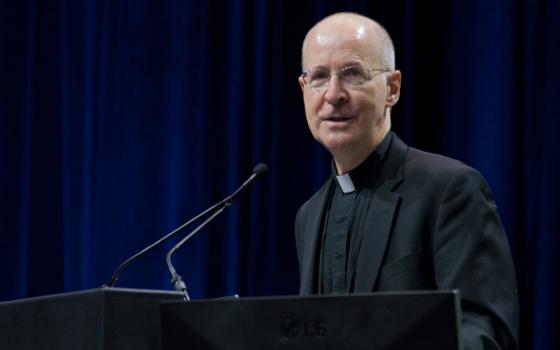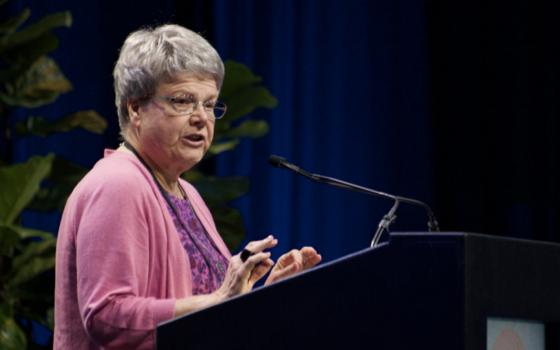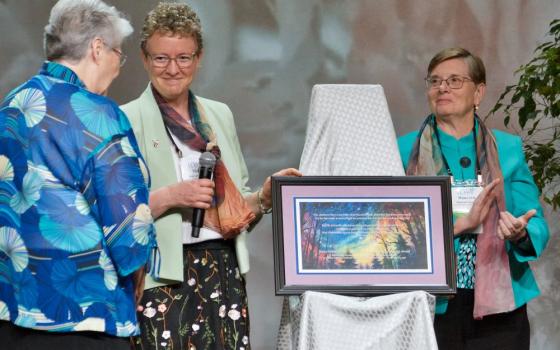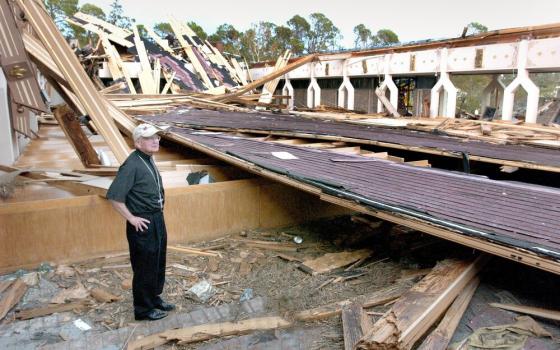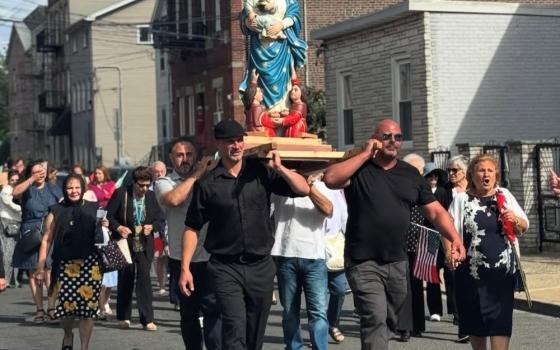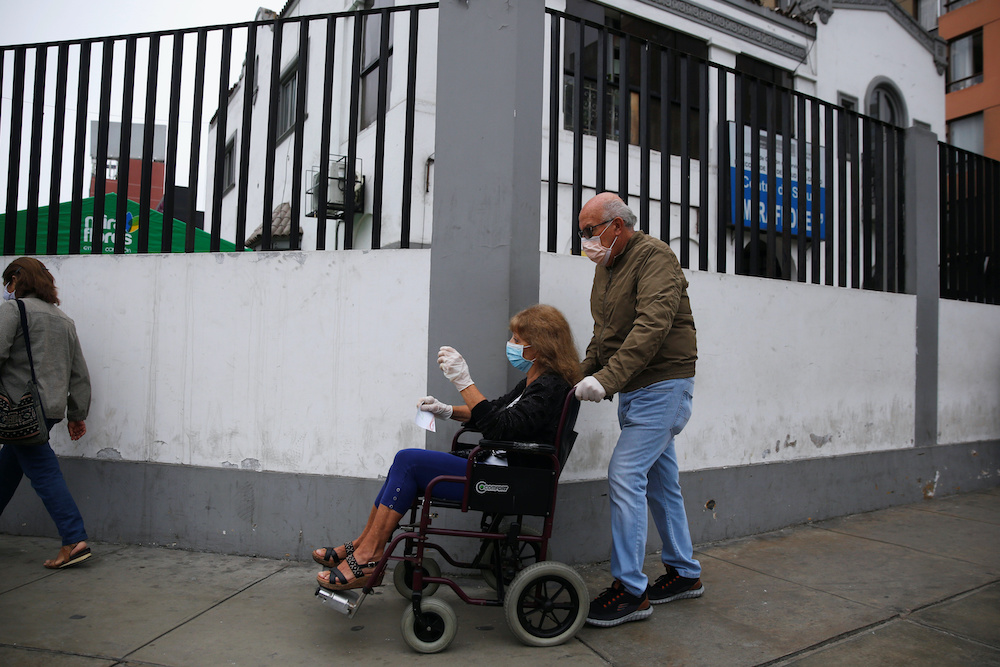
An elderly patient is taken into a health center March 17 in Lima after the Peruvian government closed the country's borders in response to the outbreak of the novel coronavirus that causes the respiratory illness COVID-19. (CNS/Reuters/Sebastian Castaneda)
In the midst of a crisis, do not forget or neglect "the least of these" in the immediate community or in the larger world.
That is the common refrain sisters told Global Sisters Report when asked about their reaction to the unfolding COVID-19 pandemic.
"The sudden onslaught of the coronavirus impresses upon us our oneness with the global community. All are affected or infected," said Sr. Joan Mumaw, a member of the Sisters, Servants of the Immaculate Heart of Mary and the president and chief administrative officer for the Maryland-based Friends in Solidarity, the U.S. partner to Solidarity with South Sudan.
"It's hitting everybody on a basic level," Sr. Marilyn Lacey, executive director of the humanitarian agency Mercy Beyond Borders and a member of the Sisters of Mercy, told GSR in an interview.
But Mumaw, Lacey and the other sisters contacted all said that if the impact is being felt everywhere, the effects of the pandemic will hit economically poorer communities and countries with much greater ferocity.
Lacey pointed out that in South Sudan, for example, the coronavirus is yet another challenge in a country where malaria, dysentery and cholera are a daily reality.
The need to be conscientious about washing hands is sensible, Lacey said, but she noted that in South Sudan, "some people have to walk a half-mile to get water." In that context, she said, "there are no possible options for hand-washing."
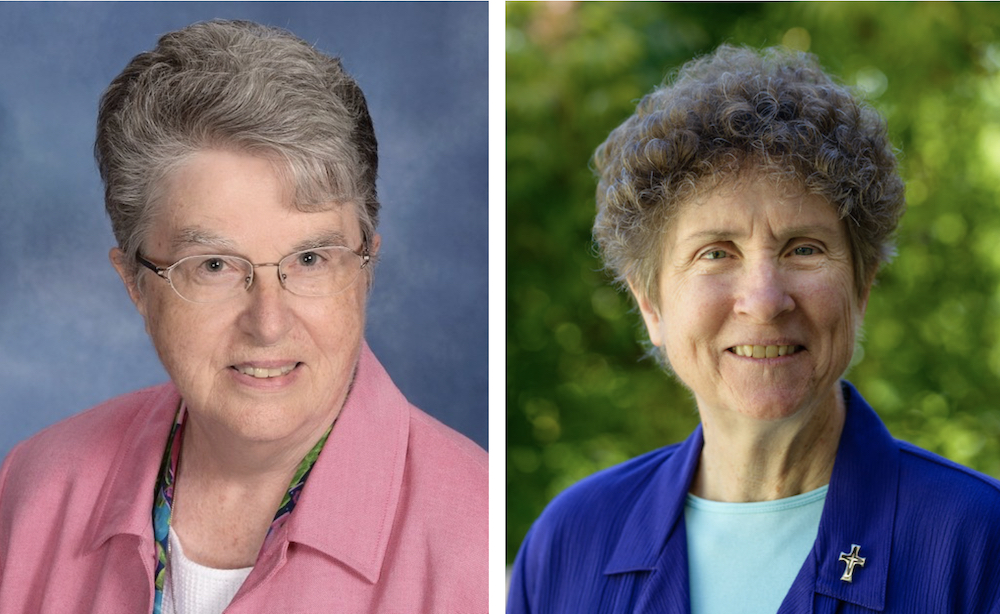
Left: Sr. Joan Mumaw of the Sisters, Servants of the Immaculate Heart of Mary (Provided photo); Right: Mercy Sr. Marilyn Lacey (Mercy Beyond Borders)
"Or what do you do when you have three girls sharing a bed at boarding school — and that's among the safest places in the country?" she said.
The gift that sisters might provide at the present moment, Lacey said, is "a sense of calm" as well as purpose: "calling people, leveraging institutional resources for people on the ground."
In the United States, Lacey said she hopes "people will rise to the occasion" and that the crisis will not further fracture a politically divided nation. At the very least, she said, this could "give us such compassion for displaced people and migrants" and others at the margins of society.
Other reactions via email, which have been edited and condensed, include reactions from Mumaw as well as:
- Sr. Simone Campbell, a Sister of Social Service who heads the Washington, D.C.-based Network, the national Catholic social justice lobby;
- Sr. Carol De Angelo, director of the Office of Peace, Justice and Integrity of Creation for the Sisters of Charity of New York;
- Sr. Judy Dohner, an American Sister of the Humility of Mary, a former missionary in Haiti who now works among Haitians living in southwest Florida and volunteers at Catholic Charities; and
- Ursuline Sr. Alice Marie Giordano, coordinator of Justice, Peace, and the Integrity of Creation Office for the Ursuline Sisters' Eastern Province of the United States.
Sr. Joan Mumaw: 'No one will escape the impact'
No one will escape the impact, be it in the health care sector, education or the economy. This is true especially for the most vulnerable among us and those with whom we minister and for Solidarity, the people of South Sudan. The new interim government there has closed the borders to flights from countries with people infected with the virus. Our executive director and one staff member just returned from Ireland and are in self-imposed isolation for two weeks in [the capital of] Juba.
South Sudan is not prepared to handle this health emergency, so we pray it can be contained just as the [neighboring] Democratic Republic of Congo has been able to contain the Ebola virus. South Sudan has neither the trained personnel nor facilities to cope with a full-blown pandemic. It does have the assistance of many nongovernmental organizations, which have the expertise and resources to assist with containing the virus when it emerges in the population. There is also a developing use of radio in many areas of the country, which can get the message out of how to protect the population against the virus.
This is all the more reason why Solidarity with South Sudan needs to continue to support the training of registered nurses and midwives building the capacity of the health care system serving this vulnerable population.
Sr. Simone Campbell: 'Come, Holy Spirit'
A Catholic sister's ministry with her many colleagues can be just about anywhere. For me and my friends, it is on Capitol Hill, trying to create federal policy that will really benefit those on the bottom half of the income ladder. We work on policies that we hope will keep food on the table and health care available for our most vulnerable people. It is challenging, working from home in constant email and phone connection. We are trying desperately to ensure that the corporations who refuse to pay their fair share of taxes wait for a federal handout until their workers are protected.
I was up to my elbows in the midst of this struggle, and then I got a call. The caller asked: Would I be on a national secular political call to share the faith perspective in this time of political and economic struggle? I realized once again that for me, as a sister, my role has a double purpose.
Yes, I advocate for those often left out, but my care is not just for them. My care is also for our policy-makers and for all those who struggle to make our nation a more perfect union. I do not know what I will say, but my fervent prayer is "Come, Holy Spirit." I have never been left orphan, and I trust that my ministry also will be sustained in these impossible and confusing times.
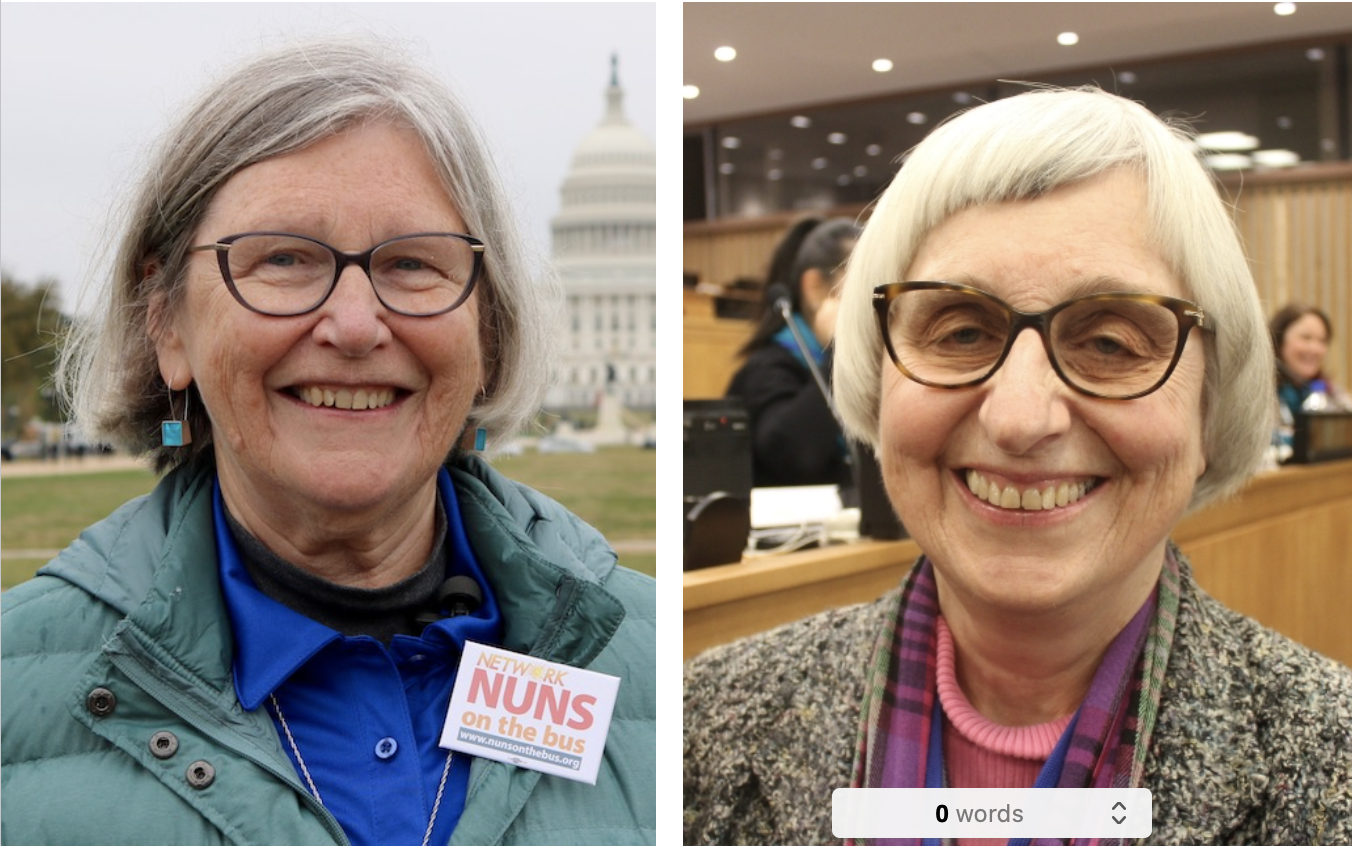
Left: Social Service Sr. Simone Campbell (Network Lobby for Catholic Social Justice/Colleen Ross); Right: Sr. Carol De Angelo, director of the Office of Peace, Justice and Integrity of Creation for the Sisters of Charity of New York (GSR file photo)
Sr. Carol De Angelo: 'These days will be ones of prayer'
There are so many things one can say as a person of faith about what is happening as we experience the COVID-19 crisis. It is scary and of great concern for family, friends, for our human family in New York City, where I live, and the global family.
I am grateful that the people I know are staying informed about the latest developments, guidelines and practices, such as frequent hand-washing and social distancing, and that people are following them, whether we feel sick or not. I think people "get it" that it is up to us, the people, to keep the numbers of those seriously ill with COVID-19 from spiking quickly and that we have a slower progression of the disease.
I am grateful for our health care professionals, emergency workers, public servants who serve us so faithfully. My heart is breaking for those who are very vulnerable during this crisis. I feel very privileged. I have running water. I have space where I can distance myself at home if I get sick. I have health care.
I am very concerned about people who are homeless at this time. I called James Addison, team leader of Life Experience and Faith Sharing Associates, a Sisters of Charity-sponsored program that for 34 years has served people who are homeless. LEFSA staff members' and volunteers' work involves street ministry, visits to homeless shelters, and group leadership gatherings.
James informed me that many soup kitchens are closed; some are handing out food in bags. Following the precautions they needed to take, James, with another staff member and a volunteer, did street ministry yesterday [Monday, March 16], speaking with people and handing them sandwiches. James always asks himself the question, "What would Jesus do?"
I am not in a direct-service ministry like LEFSA staff. The Sisters of Charity of New York Office of Peace, Justice and Integrity of Creation raises awareness, educates, advocates and works for systemic change on issues such as homelessness, food insecurity, working conditions and health care. But COVID-19 is making visible the cracks in the U.S.'s current health care and social service support systems. These cracks make all of us more vulnerable now.
I am keeping all of us in prayer. The COVID-19 crisis has shown us how interconnected we all are. This May, we celebrate the fifth anniversary of Pope Francis' "Laudato Si', on Care for Our Common Home." In it, Pope Francis calls us to an integral ecology that recognizes that all life is connected. We must address things holistically, not in silos. To achieve the well-being of Earth, our common home, and all its people, we must address social, environmental and economic areas. COVID-19 shows us the truth of this. For me, these days will be ones of prayer and reflection on how I am being called to act responsibly for the common good and to advocate for those most vulnerable in our midst.
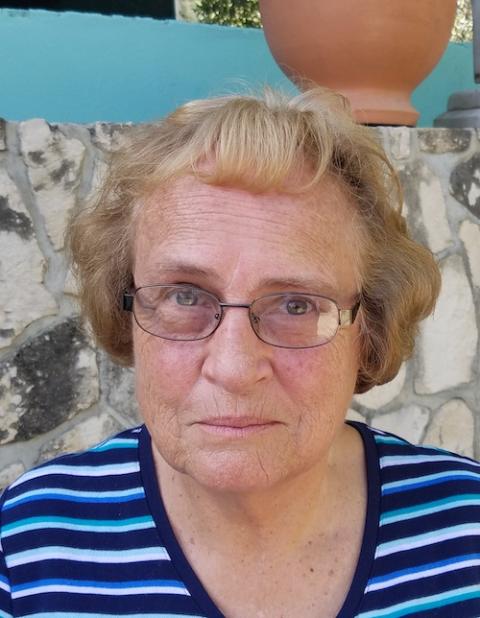
Sr. Judy Dohner of the Sisters of the Humility of Mary (GSR file photo)
Sr. Judy Dohner: 'There is no fear'
Immokalee is a migrant town of 26,000 in southern Florida. Fifty percent of the population lives in poverty, and the minority are the majority here: Mexicans, Haitians and Guatemalans. These are poor, faith-filled people. They believe God will always be on their side. Guadalupe Social Services of Catholic Charities provides a soup kitchen, food pantry and other services for the most needy. As the reality of the coronavirus evolves and we are inundated with information that changes daily, most of these people with whom I live and work learn from radio, internet, friends and family. Many things are not clear or true. But there is no fear.
When people have little to lose, they do not walk around with anxiety. They believe God has always taken care of them. The staff at Guadalupe Social Services is no longer serving in the soup kitchen, but we are providing carry-out meals daily. We are giving food bags to those who are in need, but we are not having them enter the building and sit to wait to talk with a caseworker.
We explain the need for safe space between clients while they wait. We share information in their languages about the pandemic. We are also providing homebound elders with food bags since they are most vulnerable if they leave their homes. The poor in this town are poor every day. Our services are available every day. They know we will not abandon them. We follow the example of Jesus, who would be right in their midst, too.
Advertisement
Sr. Alice Marie Giordano: preparing for the future
Right now, those of our sisters in school are busy developing their online instruction for students who will not be in school for a long time. In our offices and two convents, we have told staff, as much as possible, to remain home with family and so are covering their work where it is necessary.
I reached out to Ursuline Sr. Bernadette Mackay, who works as director of missions for the Orlando Diocese in Florida. She often brings leaders from Florida to the Dominican Republic to help them understand the situation there. She is working to support students out of school in the Dominican Republic but with added urgency and difficulty.
She related the following about the situation in the Dominican Republic:
"I have spent the last several days trying to put together a work-at-home plan for the 450 students we have in our mission school, which will close in a day or two. We do not have access to technology, so we need to create a work plan in a rush and print out the materials so the kids can take it home. We have to supply them with the tools for writing and coloring, as well.
"Without some guided plan, the kids will be out playing in the mud and sharing more than dirty hugs with each other. How do we keep them safe from contaminating each other? Everyone lives almost one on top of the other. It is tiring, trying to be creative under these circumstances.
"May Mary, the great protector, keep us all safe."
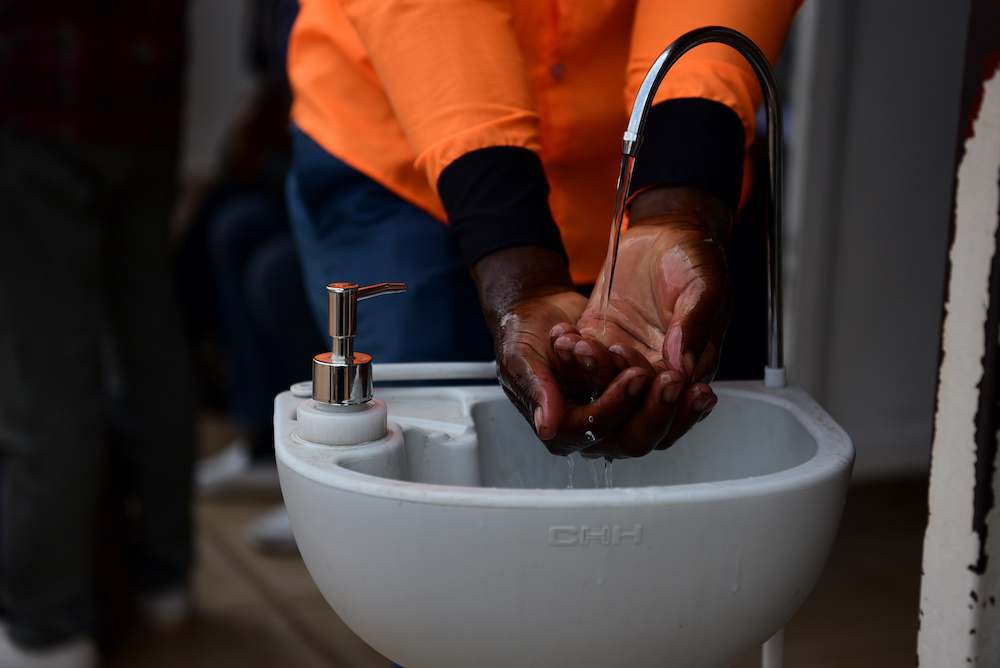
A man washes his hands at a public hand-washing station March 11 before boarding a bus as a cautionary measure against the new coronavirus in Kigali, Rwanda. (CNS/Reuters/Maggie Andresen)
[Chris Herlinger is GSR international correspondent. His email address is [email protected].]

